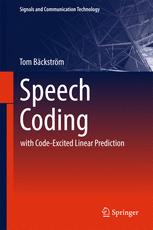

Most ebook files are in PDF format, so you can easily read them using various software such as Foxit Reader or directly on the Google Chrome browser.
Some ebook files are released by publishers in other formats such as .awz, .mobi, .epub, .fb2, etc. You may need to install specific software to read these formats on mobile/PC, such as Calibre.
Please read the tutorial at this link: https://ebookbell.com/faq
We offer FREE conversion to the popular formats you request; however, this may take some time. Therefore, right after payment, please email us, and we will try to provide the service as quickly as possible.
For some exceptional file formats or broken links (if any), please refrain from opening any disputes. Instead, email us first, and we will try to assist within a maximum of 6 hours.
EbookBell Team

0.0
0 reviewsThis book provides scientific understanding of the most central techniques used in speech coding both for advanced students as well as professionals with a background in speech audio and or digital signal processing. It provides a clear connection between the Why’s?, How’s?, and What’s, such that the necessity, purpose and solutions provided by tools should be always within sight, as well as their strengths and weaknesses in each respect. Equivalently, this book sheds light on the following perspectives for each technology presented:
Objective: What do we want to achieve and especially why is this goal important?
Resource / Information: What information is available and how can it be useful?
Resource / Platform: What kind of platforms are we working with and what are the capabilities/restrictions of those platforms? This includes properties such as computational, memory, acoustic and transmission capacity of devices used.
Solutions: Which solutions have been proposed and how can they be used to reach the stated goals?
Strengths and weaknesses: In which ways do the solutions fulfill the objectives and where are they insufficient? Are resources used efficiently?
This book concentrates solely on code excited linear prediction and its derivatives since mainstream speech codecs are based on linear prediction It also concentrates exclusively on time domain techniques because frequency domain tools are to a large extent common with audio codecs.